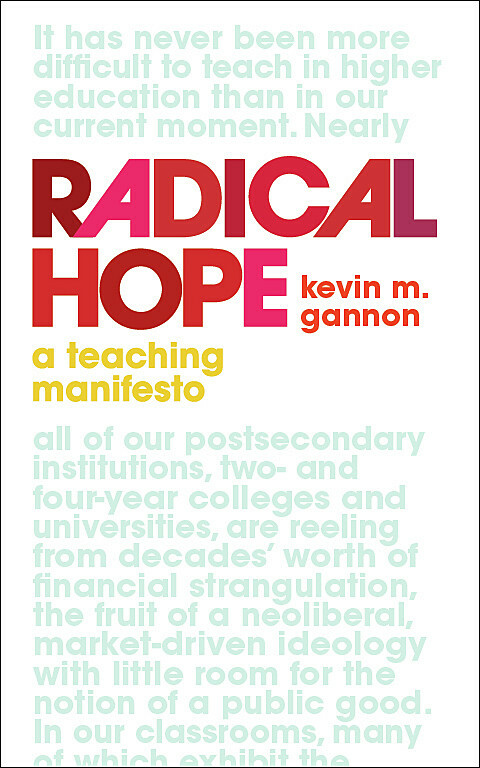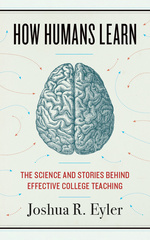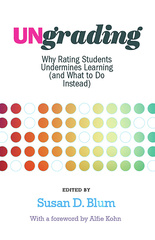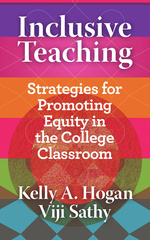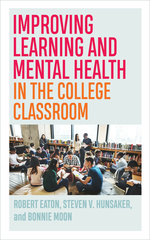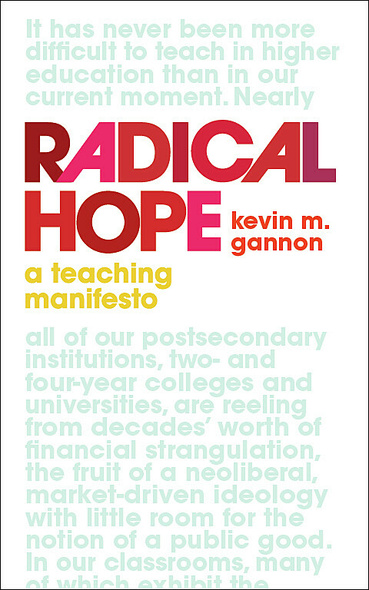
Radical Hope
A Teaching Manifesto
Higher education has seen better days. Harsh budget cuts, the precarious nature of employment in college teaching, and political hostility to the entire enterprise of education have made for an increasingly fraught landscape. Radical Hope is an ambitious response to this state of affairs, at once political and practical—the work of an activist, teacher, and public intellectual grappling with some of the most pressing topics at the intersection of higher education and social justice.
Kevin Gannon asks that the contemporary university’s manifold problems be approached as opportunities for critical engagement, arguing that, when done effectively, teaching is by definition emancipatory and hopeful. Considering individual pedagogical practice, the students who are the primary audience and beneficiaries of teaching, and the institutions and systems within which teaching occurs, Radical Hope surveys the field, tackling everything from impostor syndrome to cell phones in class to allegations of a campus “free speech crisis.” Throughout, Gannon translates ideals into tangible strategies and practices (including key takeaways at the conclusion of each chapter), with the goal of reclaiming teachers’ essential role in the discourse of higher education.
A must-read for pedagogues and theorists alike. Gannon's explorations into history, power, and academia place students and the environments in which they learn front and center for the rest of us to consider. This work isn't about reform, but transformation, and Gannon's book pushes us in the right direction.'
José Luis Vilson, author of This Is Not a Test: A New Narrative on Race, Class, and Education
This is the book I needed to read—it was a fresh drink of water in a time of turmoil and despair in education. Gannon grounds his calls for radical hope in the work of educational scholars like Freire, hooks, and Giroux, and offers helpful examples and recommendations based on his years of teaching experience. He tackles real issues we are facing at our institutions head-on without capitulating to clichés or trendy solutions often offered in books about higher education.’
Amy Collier, Middlebury College
In a time of precariously employed professors, crushing student debt burdens, and cynically manufactured campus outrages, Radical Hope is a much-needed practical and principled reminder of the promise and possibility of education for liberation.'
Nikhil Pal Singh, author of Race and America's Long War and faculty director, NYU Prison Education Program
A full-throated defense of the humanities, a liberal education, and the power of education as a transformational force.’
Contingent Magazine
It has never been more difficult to teach in higher education than in our current moment. Nearly all of our postsecondary institutions, two- and four-year colleges and universities, are reeling from decades’ worth of financial strangulation, the fruit of a neoliberal, market-driven ideology with little room for the notion of a public good. In our classrooms, many of which exhibit the effects of years’ worth of deferred maintenance, we have fewer resources with which to teach more students. Most of us, numerically speaking, do this teaching in a precarious position as adjunct and contingent faculty. Even for those of us who are tenured or on the tenure track, those guarantees mean less than they did in earlier periods; tenure is under assault across the country, and funding cuts that eliminate entire programs do not distinguish between tenured and untenured. The academic job market is a smoldering crater; faculty hiring and compensation are well below the levels we actually need to accomplish our missions. Academic freedom is under siege as grandstanding politicians decry “leftist” universities while right-wingers funding institutes at those same universities demand control over hiring and curricular decisions. Moreover, the general public is souring on higher education. A college education was once the epitome of the American dream; now, a majority of one political party believes colleges and universities have “a negative effect” on the United States, while others despair about the increasingly devastating financial burdens of higher education.1 And the nexus of all these trends is the environment in which we, as faculty, are expected to be effective—even transformative—teachers.
It has also never been more difficult to learn in higher education than in our current moment. To be a college student today requires an element of financial risk and economic uncertainty that would have been inconceivable to prior generations. The rise of the “gig economy,” the curious economic spectacle of a “jobless recovery,” and skyrocketing costs of living mean that the future looks much more uncertain to today’s students than it did for their forebears. To even get to that future, current students must shoulder an unprecedented amount of the costs of higher education themselves, as loans have become the primary means of financing the ever-increasing expense of a college education. In this climate of anxious uncertainty, it isn’t surprising that a record number of college students struggle with mental health difficulties. What’s more, funding cuts to K–12 education have mirrored, and in some areas outpaced, those that have plagued higher education. The result has been a larger number of underserved and underprepared students entering college. They then find themselves lacking some of the basic academic skills necessary for success, and despite the proliferation of developmental courses and academic support services, retention and graduation rates among these at-risk students have remained flat.2
Nor have our campus climates served all of our students well. Students of color attending classes in buildings named after eighteenth- and nineteenth-century slaveholders, for example, can testify to the prevalence of racial prejudice and microaggressions on most of our campuses. The alarming data on campus sexual harassment and assault demonstrates that for women, higher education is often not a safe space.3 A recent spike in the number of hate incidents on campuses underscores how even such a basic act as going to college is actually a threat for some of our students, who see more concern from their administrators for the right of neo-Nazis and white supremacists to have a campus platform than for their safety and well-being.4 For today’s students, the road to a college degree is fraught with uncertainty, obstacles, risk, and anxiety. For many of them, higher education is a protracted exercise more akin to siege warfare than a journey of development and discovery.
This is probably not the way you expected a book on “radical hope” to begin. This litany of problems and obstacles both faculty and students face on a daily basis seems designed to instill despair, not hope. Indeed, a weary cynicism is both an eminently understandable and frequent response to these conditions. But jaded detachment, tempting as it may be for no other reason than self-defense, is ultimately a trap—one into which we’ll drag students along with us if we fall. We’ve all encountered the grumpy, cynical faculty colleague who ceaselessly complains about their students, the institution, and likely many of their colleagues as well. The kids can’t write a coherent sentence. They don’t study. They’re on their phones all class period. The administration doesn’t give a damn about us. If we have one more useless department meeting, I swear I’ll go insane. Often, but not always, this colleague’s cynicism is borne out of decades of frustration as the gulf between their sense of vocation and their perceptions of the institutional environment has become impassable. I don’t think any of us start our careers teaching in higher education with this bitter sense of betrayal and impotence. Even if we’ve been battered by the vicissitudes of graduate education and the academic job market, we still want to enter our classrooms and make a difference for our students. The question becomes, then, how do we avoid ending up in a place where we don’t believe that what we do matters, and where we surrender to cynical detachment?
I propose that we answer cynicism with purpose, despair with hope. “Hope” is a pretty elastic term, though, and it often becomes a hollow platitude that substitutes itself for the actual work of change. I have hope in the future, the thinking goes, so I just need to survive the present; this too shall pass. But hope without action is merely fantasy. For those of us committed to changing higher education for the better, to making a genuine difference in our classrooms and on our campuses, a commitment to radical hope offers the chance to do so in a clear-eyed and sustainable manner without succumbing to hostile resignation or burned-out despair. As Jonathan Lear puts it, “what makes . . . hope radical is that it is directed toward a future goodness that transcends the current ability to understand what it is. Radical hope anticipates a good for which those who have the hope as yet lack the appropriate concepts with which to understand it.”5 To operate from a place of radical hope, though, is a daunting prospect. It requires us to discern ways of being and acting that are far from clear, and to articulate goals that only exist “at the horizons of one’s understanding.”6 Hope, as Rebecca Solnit has famously declared, “is not a lottery ticket you can sit on the sofa and clutch, feeling lucky. It is the axe you break down doors with in an emergency.”7 Radical hope eschews despair, but does so in a way that often relies upon the faith that our current thinking and actions will create a better future—even without specifically understanding what that future will look like.
Teaching is a radical act of hope. It is an assertion of faith in a better future in an increasingly uncertain and fraught present. It is a commitment to that future even if we can’t clearly discern its shape. It is a continuing pedagogical practice rather than a set of static characteristics. Simply put, we teach because we believe it matters. That may be hard to remember when we’re driving dozens of miles from one adjunct gig to another, or when we’re buried beneath a pile of papers to grade, or when we get the dean’s email about further cuts to our department’s operating budget. Yet that’s when it’s most evident, if we really think about it. Our most quotidian practices—even and especially in environments of adversity—are a constant assertion that through our work with and among our students we are creating a better future. The very acts of trying to teach well, of adopting a critically reflective practice to improve our teaching and our students’ learning, are radical, in that word’s literal sense: they are endeavors aimed at fundamental, root-level transformation. And they are acts of hope because they imagine that process of transformation as one in which a better future takes shape out of our students’ critical refusal to abide the limitations of the present.
What does it look like to teach with radical hope, then? “Imagining a process of transformation” sounds nice, but how do we do that when we’re tasked with teaching a 500-student lecture section of Psychology 101? I think it is essential for our pedagogy to remain centered in a clear set of principles that we not only put into practice, but make explicit to our students as we invite them to share in our vision. That’s an ethic we can apply in a small seminar room or large lecture hall, in an introductory general-education course or an advanced practicum, in a two-year or four-year college, in a public or private university. If hope without action is fantasy, then principles without practice are useless. Hope is the combination of aspiration and agency. Paulo Freire, the Brazilian educator and intellectual godfather of what’s become known as critical pedagogy, insisted on the primacy of “praxis.” Praxis, in Freirean terms, is the blend of “reflection and action aimed at the structures to be transformed.”8 Reflection without action has no power, while action without reflection cedes its meaning. A pedagogical praxis centered in radical hope is one that fosters openness and inclusivity, critical reflection, dialogue and conversation, and a commitment to making higher education accessible and meaningful for all of our students.
In the pages that follow, I set out my manifesto for teaching and learning, a manifesto staking claim to a better future even within our specific present. Ever mindful of Freire’s injunction to combine reflection and action, I ground this manifesto on distinct theoretical terrain but also focus on specific ways in which we can translate that theory into our actual teaching practices. The following chapters function similar to a set of concentric circles, centered in our individual philosophies, approaches, attitudes, and practices but radiating outwards into the larger settings of classrooms and institutions as a whole. At the end of each chapter, to foreground the importance of praxis, I offer a few points for discernment and reflection as the first steps in putting principles “into practice” (the title for these sections).
Radical hope needs to be more than a slogan; it has to be the set of lenses through which we see our pedagogy, our students, and our institutions. This book is meant to help with that discernment. What I offer here is not the way, but one way in which we can meet the challenges of our present with practices that embody our faith in a better future for us and our students. Most importantly, though, over and throughout this manifesto is the unwavering belief that teaching is a radical act of hope.
Now let’s get radical.
Introduction
1. Classrooms of Death
2. The Things We Tell Our Students
3. Cultivating Transformative Teaching
4. Teaching and Learning Inclusively
5. Making Access Mean Something
6. Encouraging Choice, Collaboration, and Agency
7. A Syllabus Worth Reading
8. Pedagogy Is Not a Weapon
9. Platforms and Power
10. I Don’t Know . . . Yet.
Coda: Radical Hope, Even When It Seems Hopeless
Notes
Index

